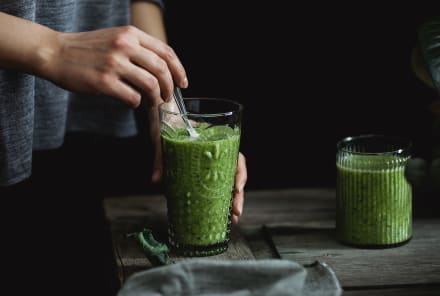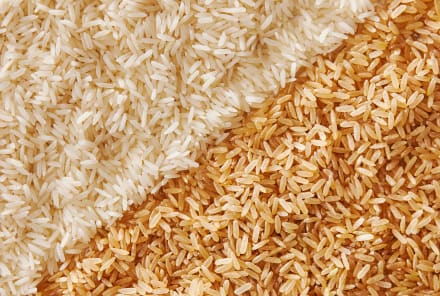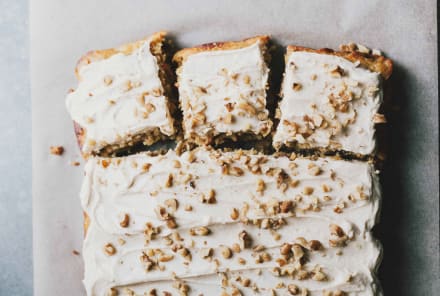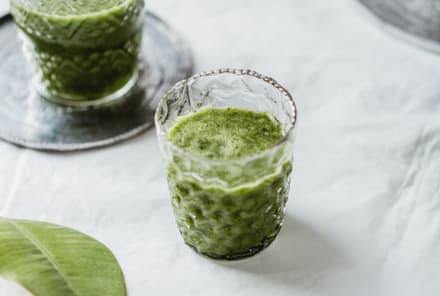Advertisement
Can Hibiscus Tea Actually Cause Hallucinations? We Investigated


Known for its tart flavor and pretty pink hue, hibiscus tea is an impressive herbal remedy. It's packed with antioxidants, naturally free of caffeine, and tastes great hot or cold. And for most people, hibiscus tea is a drink that makes them feel wonderfully refreshed and rejuvenated. But apparently, this isn't the case for everyone. According to anecdotal reports, some people have experienced hallucinations after consuming hibiscus tea—even call the occurrences "hibiscus drunk" or "hibiscus intoxication," referring to the supposedly woozy feeling they get after drinking the infusion.
So, what gives? Is the popular herbal beverage a hallucinogen in disguise? Let's delve into the possible reasons behind this rare phenomenon.
Hibiscus tea & hallucinations—is that real?
To date, there's no scientific evidence that suggests hibiscus tea hallucinations are real. So, no: Any cases of hallucinations have been purely anecdotal. Researchers haven't studied this reported side effect or why people claim they are experiencing these symptoms. After all, hibiscus is recognized as safe, and it's usually not associated with serious side effects. Yet, despite the lack of research, there might be a viable explanation for what people are experiencing.
So what's going on when people say they get "hibiscus drunk"?
Again, this is all purely anecdotal and theoretical—so there's no way to know for sure given the lack of research. Hibiscus has natural antihypertensive properties, which means it can lower your blood pressure. In fact, the herb has been used to treat high blood pressure for thousands of years. For example, a 2019 study found that hibiscus significantly lowered blood pressure1 in people with Stage 1 hypertension. According to the study researchers, the active compounds in hibiscus make the vascular endothelium2 (the cells that line the blood vessels) release nitric oxide. The nitric oxide then relaxes blood vessels3, which decreases blood pressure. This is how common hypertension drugs4, like hydralazine and minoxidil, work in the body.
In a person with hypertension, this effect might make their blood pressure drop closer to normal levels. But for someone who already has normal to low blood pressure, it could potentially result in low levels. Low blood pressure can cause dizziness, lightheadedness, blurry vision, and poor concentration. It may even lead to nausea or fatigue. Basically, low blood pressure can make you feel unsteady and out of touch—which may explain what some people have felt after drinking hibiscus tea.
Are there other hibiscus tea side effects? Yes, but they're very rare.
In terms of safety and tolerability5, hibiscus tea has a solid track record. But beyond the alleged hallucinations, other complications might be possible. These side effects are uncommon and haven't been thoroughly researched. Plus, they're typically associated with drinking excessive amounts of the tea.
- Hibiscus tea might make your blood pressure drop too much. Due to its effect on blood pressure, hibiscus tea could pose a risk if you already have hypotension. The same goes for if you have a medical condition that causes low blood pressure, such as bradycardia (low heart rate). If you have a history of hypotension, talk to your doctor before consuming hibiscus tea.
- The herb could interact with your prescription medication. Like other herbal concoctions, hibiscus tea might cause undesirable herb-drug interactions. Specifically, the sour herb may interfere with cardiovascular medications6, including antihypertensives and cholesterol-lowering drugs like simvastatin7. It's also recommended to use caution if you're taking antidiabetic medications, as animal studies suggest that hibiscus may also lower blood glucose8.
- As a diuretic, hibiscus can make you pee more often. Hibiscus is a natural diuretic9, so it promotes urination—especially when consumed as a tea. And though peeing on the regular is great for preventing urinary tract infections, drinking hibiscus tea might make you pee more than you're used to. Keep this in mind if you're already taking a diuretic (or are going on a road trip).
- Have a ragweed allergy? You might be allergic to hibiscus tea, too. If you're allergic to ragweed pollen, it means your immune system is sensitive to certain proteins in ragweed. And as luck would have it, hibiscus has proteins that are structurally similar. Consuming hibiscus could potentially cause an oral allergy reaction10, which may involve the mouth, tongue, lips, and throat.
- Consult with your doctor if you are pregnant. Phytoestrogens are plant chemicals that function like estrogen in the body. Hibiscus happens to be high in these compounds, so it might interact with some types of birth control. Additionally, it's recommended to avoid hibiscus tea during pregnancy, as there isn't enough research to prove its safety. In either case, use caution and consult your gynecologist, doula, or midwife before trying any herbal teas.
The bottom line:
While hibiscus tea is overwhelmingly considered safe, it's still important to be mindful of how your body reacts. Consider sipping on a different tea if hibiscus makes you feel all sorts of strange. Otherwise, enjoy this pink-red tea in moderation to avoid any unwanted side effects.
10 Sources
- https://www.ncbi.nlm.nih.gov/pmc/articles/PMC6621350/
- https://www.ncbi.nlm.nih.gov/pubmed/26994427
- https://www.sciencedirect.com/science/article/pii/S030881461400692X
- https://academic.oup.com/jn/article/140/2/298/4600320
- https://www.ncbi.nlm.nih.gov/pubmed/25038696
- https://www.ncbi.nlm.nih.gov/pubmed/28873717
- https://www.ncbi.nlm.nih.gov/pubmed/28925046
- https://www.ncbi.nlm.nih.gov/pubmed/29726706
- https://www.ncbi.nlm.nih.gov/pubmed/22178178
- https://www.ncbi.nlm.nih.gov/pmc/articles/PMC4655061/
Watch Next
Enjoy some of our favorite clips from classes
Enjoy some of our favorite clips from classes
What Is Meditation?
Mindfulness/Spirituality | Light Watkins
Box Breathing
Mindfulness/Spirituality | Gwen Dittmar
What Breathwork Can Address
Mindfulness/Spirituality | Gwen Dittmar
The 8 Limbs of Yoga - What is Asana?
Yoga | Caley Alyssa
Two Standing Postures to Open Up Tight Hips
Yoga | Caley Alyssa
How Plants Can Optimize Athletic Performance
Nutrition | Rich Roll
What to Eat Before a Workout
Nutrition | Rich Roll
How Ayurveda Helps Us Navigate Modern Life
Nutrition | Sahara Rose
Messages About Love & Relationships
Love & Relationships | Esther Perel
Love Languages
Love & Relationships | Esther Perel











